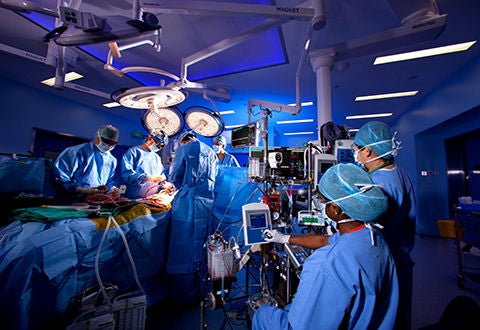
Retiree Wong Yin Tau, 70, would have been dead years ago, if not for a small handphone size device implanted in his body in 1994.
The device, which can shock a heart back to life, has saved him so many times that he has lost count.
Today, he is the National Heart Centre's longest surviving ICD patient.
Fourteen years ago, Mr Wong suffered a heart attack which left him with damaged heart tissue and an abnormal heart function of about 30per cent.
Normal heart functions are anything above 50 per cent.
Mr Wong also suffered from an irregular heart rhythm.
This put him in the category of people at risk of sudden cardiac death.
His doctors advised him to get the device, known as an implantable cardiac defibrillator (ICD), to prevent him from dying prematurely.
Said Mr Wong in Mandarin: 'I didn't want to do it because it was very expensive and I didn't have money.'
But his doctors urged him to do it. He was Singapore's third patient to be implanted with the device.
Said Dr Teo Wee Siong, a senior consultant at the Department of Cardiology and director of Electrophysiology and Pacing at the National Heart Centre, who operated on Mr Wong: 'Fortunately for him, the first device was free.'
The Lee Foundation had donated money, without which it would have been difficult to start the ICD programme and demonstrate its usefulness in Singapore, said Dr Teo.
COSTS: $10,000 - $50,000
He said the device used to cost $30,000 each, but now the cost ranges from $10,000 to $50,000 per device, depending on the model and features.
An ICD is an electrical impulse generator that can sense when the heartbeat is too fast or too slow and can pace the heartbeat back to normal without the patient even realising it.
It can also deliver a shock to the patient's heart if pacing fails to bring the heartbeat back to normal.
'Some patients describe that as someone giving them a kick in the chest,' said Dr Teo.
Indeed, this was what Mr Wong had felt many times over the years.
'KICKED' BACK TO LIFE
Said Mr Wong: 'I know my life has been saved many times, because I have felt the kick many times.'
In 1994, when he was 56, he broke out in a cold sweat and had difficulty breathing.
He was taken in an ambulance to Tan Tock Seng Hospital, where he lost consciousness.
'When I woke up, I was bleeding from my nose, my ears and my mouth. They had to shock my heart many times,' he said.
He was then sent to Singapore General Hospital for further treatment.
'That was where I met Dr Teo,' said Mr Wong.
At the time, the ICD was new.
Said Dr Teo: 'If someone collapses outside of a hospital setting, the chances of him surviving is less than 5 per cent.
'That is why more and more of such devices are used for patients at risk of dying suddenly.
'We could try drugs on them, but drugs fail 30 to 50 per cent of the time.'
Annually, about 5 to 10 per cent of such patients are at risk of sudden death.
'The challenge is to identify these people before they collapse,' said Dr Teo.
Since 1992, between 400 and 500 people have had the device implanted. Each device can last between five and seven years.
Mr Wong has had his implant replaced twice, the last time in November 2006. He needs to top up government subsidies for the two replacement devices as the Lee Foundation is no longer funding the ICD programme.
Said Mr Wong: 'I live life one day at a time now. It's amazing to me that I have survived for so long since that terrible night so many years ago.'
He can still walk and carry out his daily routine.
'At home, I am okay. I can watch TV for a few hours, then read the newspapers for a couple of hours. On weekends, my daughter visits with her children,' he said.
But he limits his outings as he cannot walk far before getting breathless.
'And I keep needing to go to the toilet! So it's inconvenient. But I'm happy to be alive and be able to see my grandchildren grow up,' he said.
------------------------------------------------------------------------------------------------------
NHC event raises funds for needy
The National Heart Centre Singapore is celebrating its 10th Anniversary this year.
In line with its celebrations, NHC held a charity event, Hearty Marine, on 15 Mar at Sentosa for some of NHC’s needy cardiac patients.
The patients who get Medifund/Hospital Fund assistance for their medical bills, must cope not only with the stress of their illnesses, but also the emotional and financial demands, said a NHC spokesman.
Proceeds went to 32 families who visited attractions in Sentosa with children.
A dinner will be held this Sunday to pay tribute to the many doctors who have contributed to the evolution of cardiac medicine in Singapore.
Source: The New Paper
© Singapore Press Holdings Limited. Permission required for reproduction.













 Get it on Google Play
Get it on Google Play